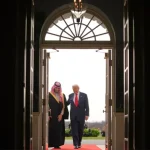
Empires produce innumerable headaches. Sensible Americans have known this for more than two centuries.
According to the Indonesian-language news site Ulasan, the Cameroon-flagged tanker Liberty ran aground in shallow water around Asam Island south of Singapore on Dec. 2.
The Liberty forms part of an illicit “shadow fleet,” a group of tankers that evade international regulations by concealing their whereabouts and transporting goods such as oil from sanctioned nations.
For the 2nd time in 14 months, yet another Dark Fleet tanker has run aground west of the Singapore Strait. The vessel has been identified as LIBERTY (9207027).
According to our research, she’s laden with nearly a million barrels of Venezuelan fuel oil.https://t.co/JulhoMGgiK
— TankerTrackers.com, Inc. (@TankerTrackers) December 8, 2023
Trending:
Bloomberg reported that the Liberty “had previously falsified its location to avoid detection on digital ship-tracking systems.”
In fact, the report cited data from vessel-tracking services TankerTrackers.com and Kpler showing that at the same time the Liberty took on a cargo of oil off the coast of Venezuela, it used “spoofing” to deceive digital tracking systems into identifying its location as near West Africa.
Since 2019, the U.S. has imposed harsh sanctions on Venezuelan oil. Those sanctions were designed to put pressure on Venezuelan President Nicolas Maduro’s repressive regime.
According to Reuters, however, the Biden administration eased those sanctions in October after Maduro agreed to a deal with opposition parties ahead of the 2024 Venezuelan election.
Should confronting these vessels be a priority for world navies?
Yes: 0% (0 Votes)
No: 0% (0 Votes)
At minimum, therefore, the timing of the Liberty incident seems strange. The vessel cloaked its presence in Venezuelan waters despite the fact that oil sanctions had eased.
Indeed, it is not as if maritime experts had no idea of the ship’s existence.
For instance, the vessel-tracking service Marine Traffic identified the Liberty as a crude oil tanker flying the Cameroonian flag. As of Monday, the tracking service placed the Liberty’s current location as “INDO – Singapore Area.”
Marine Traffic also indicated that the Liberty was built in 2000.
And therein lay part of the problem. In short, older “shadow fleet” vessels pose potential safety risks.
This month, the International Maritime Organization — the maritime regulation arm of the United Nations — called for crackdowns on the “shadow fleet,” according to Splash247.com.
An IMO resolution, for instance, took special aim at the practice of concealing identity or evading detection. The resolution encouraged port states that encounter suspicious behavior to “subject such ships to enhanced inspections.”
Of course, the “shadow fleet” has another political dimension.
Russia’s February 2022 invasion of Ukraine prompted Western leaders to impose sanctions on Russian oil. In response, Russian President Vladimir Putin turned to the “shadow fleet,” according to the Financial Times.
Russian oil expert Craig Kennedy of Harvard’s Davis Center monitored the situation as Putin’s “shadow fleet” grew to more than 100 oil tankers by December 2022.
“We’ve seen quite a number of sales to unnamed buyers in recent months, and a few weeks after the sale many of these tankers pop up in Russia to take their first load of crude,” Kennedy told the Times.
In short, the “shadow fleet” presents several complications.
On the safety side, international organizations and the people of port states have an interest in preventing environmental calamities.
Meanwhile, aging tankers owned and operated by unscrupulous individuals also serve regimes the U.S. regards as hostile.
One way to avoid the political complications, of course, would be to adopt a more restrained international approach. Putin’s “shadow fleet,” for instance, would not become a U.S. concern if the U.S. did not wage a proxy war against Russia through Ukraine.
The U.S. will always support “freedom and independence” with “her heart, her benedictions, and her prayers,” Secretary of State John Quincy Adams said in 1821.
“But she goes not abroad in search of monsters to destroy,” he wisely added.






